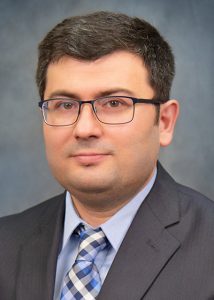U.S. National Science Foundation Awards Funding to ECE-led Group
March 15, 2024
Department of Electrical and Computer Engineering Assistant Professor Ali Cafer Gurbuz is leading a team that received an award of $500,000 from the U.S. National Science Foundation to facilitate coexistence between active communication and passive sensing systems.

Dr. Ali C. Gurbuz
Gurbuz serves as principal investigator of a project, INtegrated Testbed Ensuring Resilient Active/Passive CoexisTence (INTERACT): End-to-End Learning-Based Interference Mitigation for Radiometers. He is also working with ECE Associate Professor Vuk Marojevic from MSU and Associate Professor Mehmet Kurum from The University of Georgia.
The project INTERACT will develop experimental systems to collect active/passive RF coexistence datasets with ground truth information and develop data-driven learning-based RF interference detection and mitigation approaches enabled by the generated data.
Gurbuz noted that as the next-generation communication and satellite systems utilize more frequency bands, the potential interference risks to passive sensing systems used for environmental and atmospheric observations are increasing.
“The real progress and impact that has been seen in computer vision and deep learning areas have been due to large datasets with more than a million data samples in some cases, whereas radio frequency domains, specifically RF coexistence problems, are still in need of such large datasets to enable similar performance boosts for RF interference (RFI) detection, identification, classification, and mitigation,” he said. “Our project will develop the testbed and the data along with algorithms that will facilitate coexistence between active communication and passive sensing systems.”
The testbed and dataset generated by this project will be made publicly available to the research community, opening new avenues for communication and sensing researchers to explore novel approaches to previously unaddressed problems.
The Department of Electrical and Computer Engineering at Mississippi State University consists of 27 faculty members (including seven endowed professors), seven professional staff, and over 700 undergraduate and graduate students, with approximately 100 being at the Ph.D. level. With a research expenditure of over $14.24 million, the department houses the largest High Voltage Laboratory among North American universities.
